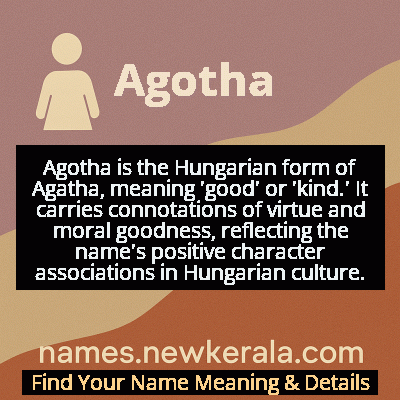Agotha Name Meaning & Details
Origin, Popularity, Numerology Analysis & Name Meaning of Agotha
Discover the origin, meaning, and cultural significance of the name AGOTHA. Delve into its historical roots and explore the lasting impact it has had on communities and traditions.
Name
Agotha
Gender
Female
Origin
Hungarian
Lucky Number
7
Meaning of the Name - Agotha
Agotha is the Hungarian form of Agatha, meaning 'good' or 'kind.' It carries connotations of virtue and moral goodness, reflecting the name's positive character associations in Hungarian culture.
Agotha - Complete Numerology Analysis
Your Numerology Number
Based on Pythagorean Numerology System
Ruling Planet
Neptune (Ketu)
Positive Nature
Intuitive, analytical, spiritual, and inquisitive.
Negative Traits
Secretive, reserved, aloof, and can be overly critical.
Lucky Colours
Green, yellow.
Lucky Days
Monday.
Lucky Stones
Cat’s eye, moonstone.
Harmony Numbers
1, 5, 6.
Best Suited Professions
Scientists, researchers, spiritual leaders, detectives.
What People Like About You
Depth of knowledge, analytical skills, spirituality.
Famous People Named Agotha
Agotha Kristóf
Writer
Internationally acclaimed Hungarian-born Swiss author
Agotha Bálint
Actress
Prominent Hungarian theater and film performer
Agotha Bárány
Educator
Established schools for underprivileged children in Hungary
Name Variations & International Equivalents
Click on blue names to explore their detailed meanings. Gray names with will be available soon.
Cultural & Historical Significance
Extended Personality Analysis
Women named Agotha are typically characterized by a remarkable combination of inner strength and genuine kindness, reflecting the name's core meaning of 'goodness.' They often possess strong moral compasses and demonstrate consistent reliability in both personal and professional relationships. Their kindness is active and practical rather than merely sentimental, manifesting as tangible support for those in need. Agothas tend to be resilient individuals who face challenges with both emotional intelligence and practical problem-solving skills. They often serve as pillars in their communities, offering stability and wisdom during difficult times. While they value tradition and stability, they also demonstrate adaptability when circumstances require change. Their approach to life balances heartfelt compassion with clear-eyed realism, making them both trusted confidantes and effective leaders. Many develop strong intuitive understanding of human nature, allowing them to navigate complex social situations with grace and insight.
Modern Usage & Popularity
In contemporary Hungary, Agotha occupies a niche as a traditional name with distinctive character, experiencing moderate use among families seeking names with historical depth and cultural specificity. While not ranking among the top 100 most popular names in recent years, it maintains steady usage particularly in regions with strong Hungarian traditions and among families valuing their cultural heritage. The name has gained some renewed interest through literary associations with author Agotha Kristóf, appealing to educated urban families. Its current usage patterns show it to be more common as a middle name than a first name, though some parents choose it as a first name to honor family traditions or express cultural pride. The name's relative rarity in modern times gives it an air of distinction while remaining familiar within Hungarian society, and it may see increased popularity as trends shift toward reviving traditional names with authentic cultural roots.
Symbolic & Spiritual Meanings
Symbolically, Agotha represents the powerful combination of virtue and resilience, embodying the idea that true strength manifests through consistent goodness and moral courage. The name serves as a metaphor for cultural endurance, representing how traditional values and identities can be preserved through linguistic and naming practices across generations. In Hungarian context, it symbolizes the maintenance of national character amid foreign influences, reflecting the country's historical experience of preserving its language and culture. Agotha also carries connotations of authentic femininity that balances nurturing compassion with unwavering strength. The name suggests a deep connection to fundamental human virtues that remain relevant regardless of changing social norms. It represents the concept that personal identity rooted in meaningful tradition provides a stable foundation for navigating modern complexities, and that kindness, when combined with determination, becomes a transformative force in both individual lives and communities.

